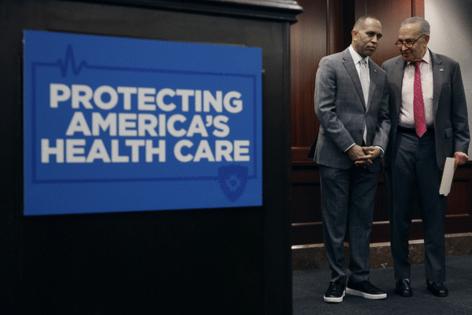450K Pennsylvanians with Obamacare could see dramatic spikes in health care costs
Published in News & Features
Record numbers of people in the U.S. enrolled in Affordable Care Act health insurance plans this year, including nearly a half million Pennsylvanians.
And 90% of Pennsylvanians who enrolled — 446,994 — are paying much lower monthly premiums for Obamacare coverage, thanks to enhanced premium tax credits enacted under former President Joe Biden. Minority and low-income families have been among the biggest beneficiaries.
But those credits expire at the end of this year, which will mean dramatic premium hikes in 2026 unless Congress votes for an extension. Whether that happens is uncertain, but action is needed in Pennsylvania by mid-May, when the state Insurance Department typically requires insurers to submit plans for 2026.
In the past, insurers have submitted two rate options for each of their plans, one with and the other without enhanced premium subsidies. But rates could rise significantly without the extra subsidies, said Antoinette Kraus, founding executive director of the Pennsylvania Health Access Network, a nonprofit Philadelphia-based advocacy group.
"People could pay four times more for health insurance," she said. "Our fear is this will have a really negative impact on consumers buying health insurance."
Premium tax credits, which have been available for Obamacare enrollees since 2014, are given at the time people sign up for the coverage, which reduces their monthly payments. The credits were enhanced through the America Rescue Plan in 2021 and again through the Inflation Reduction Act in 2022.
The additional subsidies pushed U.S. enrollment in Affordable Care Act plans to 23.6 million this year and 496,661 in Pennsylvania — both records.
But extending the enhanced premium tax credits won't come cheap: the Congressional Research Service estimates that the extension will increase federal spending by $86.5 billion next year alone at a time when Republicans, who control the White House and Congress, are looking for ways to cover tax cuts that also run out at the end of the year.
President Donald Trump's signature 2017 Tax Cuts and Jobs Act expires at the end of 2025 and he has indicated plans to extend it.
"Democrats have pushed to make the enhanced premium assistance permanent, but Republicans are expected to let it expire," Larry Levitt, executive vice president for health policy at KFF, a San Francisco-based health policy outfit, wrote in a December JAMA Health Forum column. "The effects on enrollment and premiums from eliminating the enhanced premium assistance would be substantial."
With cuts to Social Security and Medicare off the table and defense funding reductions unlikely under Trump, Medicaid and the Affordable Care Act are left as "prime targets for spending cuts," he wrote. "The math is inescapable."
Enhanced tax credits in Pennsylvania, which have delivered $600 million in savings annually to consumers, have driven up Obamacare enrollment by 47% since 2021, said Devon Trolley, executive director of Pennsylvania's online Obamacare marketplace, which is called Pennie. Without the subsidies, monthly premiums will rise by an average 82%, and double for people living in rural areas.
"We're not talking about millionaires here," she said. "It's really a huge impact."
_____
© 2025 the Pittsburgh Post-Gazette. Visit www.post-gazette.com. Distributed by Tribune Content Agency, LLC.







Comments